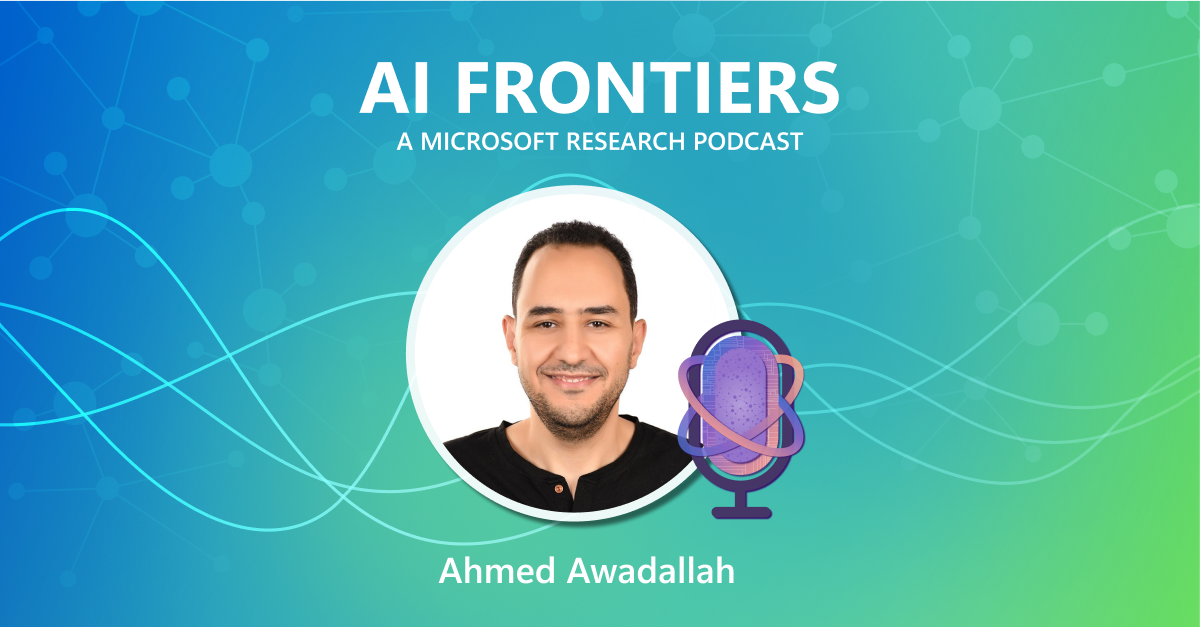Posted by
MICROSOFT RESEARCH PODCAST
AI Frontiers: The future of scale with Ahmed Awadallah and Ashley Llorens
This episode features Senior Principal Research Manager Ahmed H. Awadallah, whose work improving the efficiency of large-scale AI models and efforts to help move advancements in the space from research to practice have put him at the forefront of this new era of AI.
Some people require years of searching before they are able to identify their life’s calling. For others, though, that realization comes early on. Take Microsoft Research’s Kristin Lauter, for instance.
“I have been passionate about mathematics since I was a child,” she recalls, “doing math story problems with my father in the car.”
Now, that love for mathematics has enabled Lauter, manager of the Cryptography group at Microsoft Research Redmond, to take the next significant step in her professional career, as the next president of Association for Women in Mathematics (AWM).
That organization, founded in 1971, encourages women and girls to study and pursue active careers in the mathematical sciences—and to promote equal opportunity and the equal treatment of women and girls in mathematics.
Lauter’s term as AWM president-elect begins Feb. 1. But the path that led her to that post began long ago.
She graduated from high school at 15 and headed to the University of Chicago to study mathematics as a National Merit Scholar. Lauter went on to pursue math courses at the University of Paris and then returned to the University of Chicago to get her Ph.D. in mathematics. She then served as Hildebrandt Assistant Professor at the University of Michigan before joining Microsoft Research in 1999.
Along the way, Lauter got an early opportunity to experience firsthand what the AWM has to offer.
“I benefited from AWM early in my career,” she says, “when I received an AWM Mentoring Grant to go to Paris to work with Jean-Pierre Serre at the College de France.”
Serre was a highly influential French mathematician who won the Fields Medal in 1954 and made significant contributions to Bourbaki.
“Working with Serre was important for my career,” Lauter says, “and I published two papers with appendices authored by Serre, one in the Journal of Algebraic Geometry and one in Compositio Mathematica.”
In addition to Serre’s influence, she also found herself increasingly inspired to help increase the participation by women at the highest levels of mathematical research. Microsoft Research has been an ideal partner for her endeavors, backing her efforts to organize conferences and research prizes for women in mathematics through generous financial support.
“I believe strongly,” she says, “in the importance of research conferences for women as a way to support and encourage women at the top levels of research in mathematics.”
With such goals in mind, she has played a key role in AWM activities.
“Over the years,” she explains, “I served on various AWM committees, including the Long-Range Planning Committee, and I co-organized the AWM 40th anniversary conference at Brown University in 2011, together with then-president Jill Pipher and past president Georgia Benkart.”
“With the 40th Anniversary Conference, with 375 international participants, 18 special sessions in all areas of mathematics, 180 speakers—all female mathematicians—and four plenary talks, we launched a new tradition of biennial AWM symposia: large research meetings designed to gather and promote women researchers in mathematics.”
The second symposium occurred in Santa Clara in March 2013.
Lauter also has made a priority of increasing the visibility of women in major mathematical conferences—such as the Joint Mathematics Meetings, being held Jan. 15-18 in Baltimore.
“In 2007, I launched a research network for Women in Number Theory (WIN),” she explains, “along with co-organizers Rachel Pries and Renate Scheidler. This effort aimed to address the problem of the paucity of female speakers at top number-theory conferences worldwide and the lack of female faculty in number theory at top research universities.”
She cites some stark statistics, such as that, for decades, the percentage of tenured female faculty in mathematics at top research universities remains around 5 percent, even though women receive 25 to 30 percent of Ph.D.s granted by those same institutions.
The WIN network has conducted three major research collaboration conferences for women: WIN in 2008, WIN2 in 2011, and WINE in 2013. WIN3 is scheduled for April in Banff, Alberta.
“The goal is to build and strengthen a network of female researchers and collaborators in number theory, highlight the important research being done, provide publication venues through publishing the conference-proceedings volumes, and support the next generation of postdocs and graduate students to help them launch successful research careers,” Lauter says. “We have already achieved some success, in the form of a large WIN network with a distribution list of around 150-200 female researchers in number theory and higher visibility for research being done by women in number theory.”
In addition, Lauter helped to establish and fund the new AWM/Microsoft Research Prize in Algebra and Number Theory. The first award was presented Jan. 15 during the Joint Mathematics Meetings to Sophie Morel of Princeton University. The AWM also has created three other new prizes in various areas of number theory.
And there will be more advancements to come during Lauter’s AWM presidency.
“I plan to continue to seek broad support and NSF funding for continuing and building a large network of research conferences for women in mathematics,” she says. “This builds on an ongoing effort which I have been pushing for the last seven years, to create research-collaboration conferences for women in mathematics.”
With Lauter at the AWM helm, it sounds like the next few years will prove exciting indeed for women and girls in mathematics—particularly those who found their passion while solving math story problems as a child.



